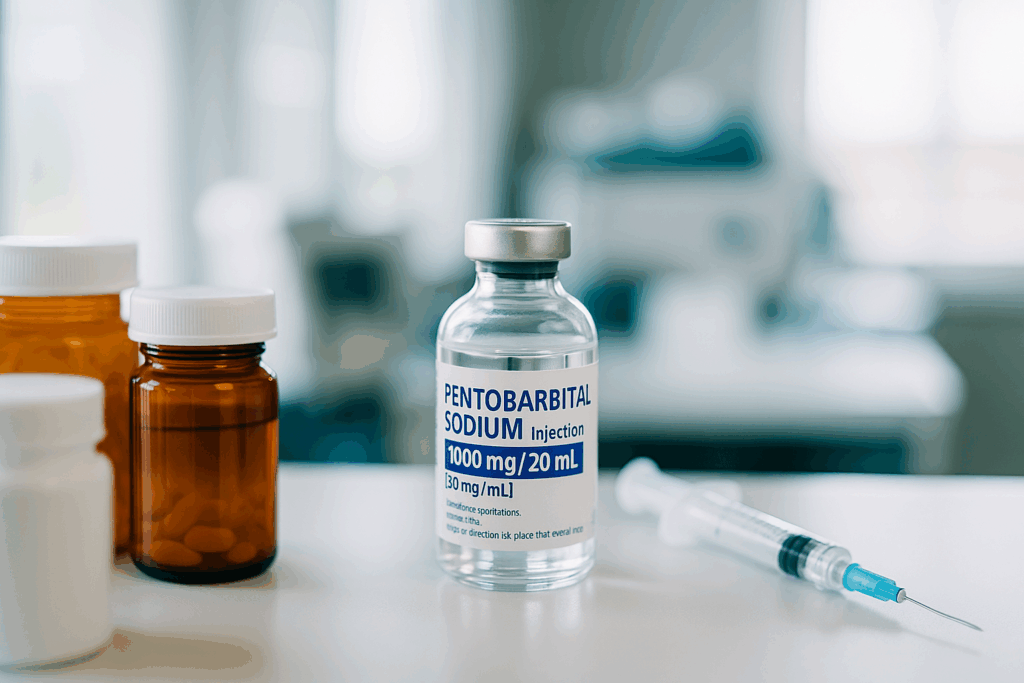
Pentobarbital is a barbiturate that has held a controversial position in medical and ethical discussions for decades. Originally synthesized in the early twentieth century, it was once widely prescribed for conditions such as insomnia, seizure management, and pre-anesthetic sedation. Over time, however, concerns about dependency, overdose risks, and misuse led to strict regulation and the eventual decline of its medical use in many countries. Today, pentobarbital is primarily recognized not as a common prescription drug, but as a substance connected to research, veterinary practices, and ongoing debates about end-of-life care.
One of the most sensitive aspects in this debate involves euthanasia. In controlled veterinary medicine, pentobarbital for euthanasia has been the standard choice for decades because of its rapid, reliable, and relatively peaceful effects. Veterinarians around the world use it in cases where suffering animals face incurable diseases or extreme pain, and the priority is to ensure dignity and comfort in their final moments. In this context, pentobarbital is not viewed through the lens of controversy, but as a tool of compassion. The same, however, cannot easily be applied to human medicine, where euthanasia laws differ widely between regions, and ethical considerations remain heavily contested.
Toxicologists and pharmacologists also pay close attention to the concept of a pentobarbital lethal dose. This phrase does not represent a recommendation or a guide, but a framework for understanding toxic thresholds and potential consequences of misuse. Academic studies often focus on quantifying lethal levels in laboratory settings to improve public safety, inform medical emergency protocols, and prevent accidental overdoses. In toxicology, a lethal dose is a technical term that indicates the quantity of a substance that may cause death in a given test population, often measured in milligrams per kilogram of body weight. This data is essential for researchers and healthcare professionals to understand the boundaries between therapeutic and harmful levels of a drug.
Ethical perspectives complicate the discussion further. While some advocates argue that pentobarbital could be an option for end-of-life care in certain medical frameworks, most healthcare systems prohibit its human application because of the risk of misuse and the moral weight associated with intentional life-ending decisions. Religious groups, legal scholars, and medical ethicists all contribute to a wide spectrum of opinions. Some see it as an expression of mercy and autonomy, while others interpret it as a dangerous shortcut that undermines the sanctity of life. The issue demonstrates how science, law, and philosophy constantly intersect in the field of medicine.
In recent years, the discourse surrounding euthanasia has intensified, with advocates pointing to suffering patients who request control over their final moments. Once again, pentobarbital for euthanasia appears in these debates, not as a practical solution, but as a symbolic representation of the wider question: should individuals be allowed to choose their own end with medical assistance? The controversy shows how one substance, strictly regulated and scientifically understood, can become an ethical and political focal point.
Meanwhile, toxicological research continues to examine the boundaries of safety. By analyzing the parameters of a pentobarbital lethal dose, researchers are not promoting its use but aiming to ensure preparedness in medical and forensic contexts. Emergency medicine must understand potential poisoning scenarios, and forensic investigations often require detailed knowledge of barbiturates in cases of unexplained deaths. Such research emphasizes the importance of viewing pentobarbital through a strictly academic and protective lens, distancing itself from sensationalism or misuse.
Ultimately, pentobarbital embodies the complex relationship between chemistry, compassion, and controversy. In veterinary practices, it represents mercy; in toxicology, it represents caution; in ethics, it represents debate. For those involved in medicine, science, or philosophy, pentobarbital is more than a chemical—it is a mirror reflecting society’s struggles with mortality, responsibility, and the search for dignity at the end of life. The path forward will not be determined by science alone, but by collective values, empathy, and the willingness to balance safety with compassion.


